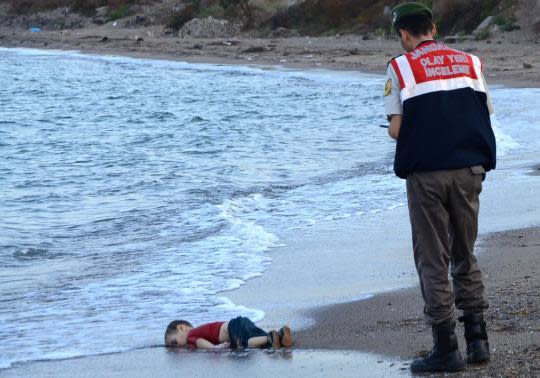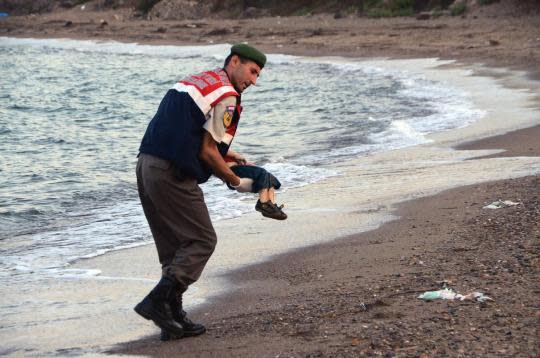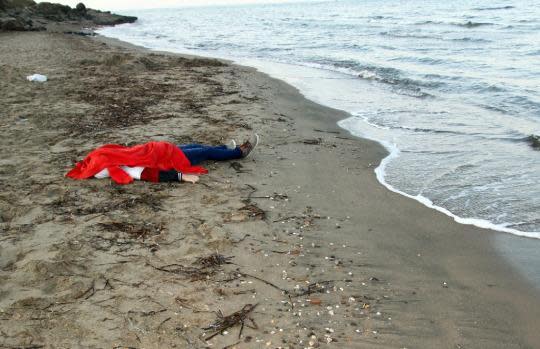This Photo of a Syrian Boy Is Hard to Look At — But It's Important

The body of Syrian refugee Aylan Kurdi, 3, washed up on the shore in Bodrum, Turkey, on Wednesday. (Photo: AFP)
Among the adorable first-day-of-school photos flooding parents’ Facebook feeds today is another set of images, ones so heartbreaking in contrast that they’re almost physically difficult to look at. But look, we must.

A Turkish police officer removes Aylan’s body from the beach. (Photo: AP)
The photographs depict 3-year-old Aylan Kurdi, whose lifeless body washed ashore in Bodrum, Turkey, on Wednesday. Aylan drowned — along with his 5-year-old brother, Galip, and their mother, Rehan, 27 — when the Greece-bound boat in which their family was fleeing Turkey sank. Nine others in the group of refugees from warn-torn Syria, hoping to make a new life in the European Union and beyond, reportedly perished that day as well, not including the boys’ devastated father Abdullah.
STORY: Story Behind Emotional Photo of Refugee Dad Carrying Sleeping Daughter

Aylan’s brother, Galip, was discovered on the shore as well. (Photo: AFP)
STORY: Dying Dad’s Beautiful Last Dance With Daughters
Images of dead children are, rightly, shocking to see on the front page of a newspaper, let alone popping up on social media amidst mundane musings about what your friends are considering to eat for lunch. And the arguments promptly put forth against sensationalizing the horror of these deaths by sharing the images aren’t entirely off base. (In the wake of the deaths, flippant memes created from the tragic photos have popped up online as well as video tributes). But human rights activists tell Yahoo Parenting that viewing these photographs, experiencing the upset that they trigger, and the haunting recollection of it afterward are important.
“These photos have awakened the consciousness of a lot of people,” Lavinia Limón, president and CEO of the U.S. Committee for Refugees and Immigrants, tells Yahoo Parenting. “When we sit here and say, ‘There are 6 million Syrian refugees,’ it just washes over people and they can’t conceptualize it. Seeing that boy on the shore brings it home.”
Limón admits she’s frustrated that this tragedy is what it seems to take for people to pay attention to the humanitarian crisis — from which half of Syria’s population has either died or fled since the conflict began in 2011. “There was a 3-year-old who died in a truck recently while fleeing with his family, but we didn’t have the pictures, God forbid,” she says. The sight of Aylan laying doll-like on the beach, still in his T-shirt, shorts, and shoes is so powerful exactly because it’s heartbreaking. The image humanizes all the overwhelming statistics so easily glossed over. “Perhaps this is what it takes to have people wake up and realize that this is something we all need to respond to,” she says. “These people are human beings.” And they’re in trouble.
“We have no doubt that this young child’s parents were trying to protect him from harm,” Bill Frelick, director of the Refugees Program at Human Rights Watch, tells Yahoo Parenting of the photos. “The heartbreaking tragedy is of an avoidable death of a very young child who died while seeking safety in Europe, but whose path for a safe and orderly way to get there was blocked.”
And Syrian refugees aren’t the only ones suffering as countries wrestle with their political policies. There’s anti-immigration controversy right here in the U.S. today, as presidential candidate Donald Trump made clear with some recent controversial remarks regarding Mexico: “When Mexico sends its people, they’re not sending their best,” he blasted. “They’re sending people that have lots of problems, and they’re bringing those problems with us. They’re bringing drugs. They’re bringing crime. They’re rapists. And some, I assume, are good people.”
The plight of Syrian refuges in particular, though, has gotten so horrific that the world needs to understand what this tragedy looks like, contend activists. And, yes, the tragedy looks like the corpse of an innocent child.
“This is a horrific image, but it is an image that we all need to see because we need to understand that our collective failure to stop the slaughter in Syria for the last four years and not welcome the people who flee its horrors are causing people to die and suffer tremendously,” declared Human Rights Watch’s emergency director, Peter Bouckaert, in an interview with Canada’s CBC. On Twitter he was even more direct. “Just pause 4 moment & imagine this was your child, drowned trying 2 flee #Syria war 4 safety of #EU #solidarity,” he wrote yesterday.
“I think of his family,” Limón adds when asked about the ethics of publishing images of a child who cannot protest being used as the face of Syrian refugees. “I think about their right to privacy. But then I realize that if it were me, knowing the horror that’s taking place right now, and if it was my son who could move the world to action, I would want that picture shown.”
She explains, “When you talk to Syrians, one of the things they say is, ‘Why has the world forgotten us?’ They say that over and over in so many ways. So I think as difficult as Aylan is to see, that is what’s going on, and we can’t turn away.”
Human Rights Watch’s communications director Emma Daly tells Yahoo Parenting that she understands how people would instinctually want to turn from the raw photographs. “When you see a photo of a small child, face down, during summer at the beach, a lot of us must think, ‘Oh my God, that could be my child,’ or ‘How horrific to see a child in this way,’” she says. “But telling this story, sharing how Aylan’s father watched his children and wife drown while getting smuggled across the ocean, really makes it clear that the European Union needs to do more to create safe and legal routes for people coming to Europe. The system as it is right now is broken. And we’re all responsible. We all have a duty to help people who have nowhere to turn.”
Look at these images, Daly urges, “and understand that this is happening — and that our politicians can do something to help.” If we look away, she adds, “This will keep happening. That is the power of this photo. It is reaching people. And if enough people understand the true cost of what is happening to refugees, they’ll help.”
Please follow @YahooParenting on Facebook, Twitter, Instagram, and Pinterest. Have an interesting story to share about your family? Email us at YParenting (at) Yahoo.com.

